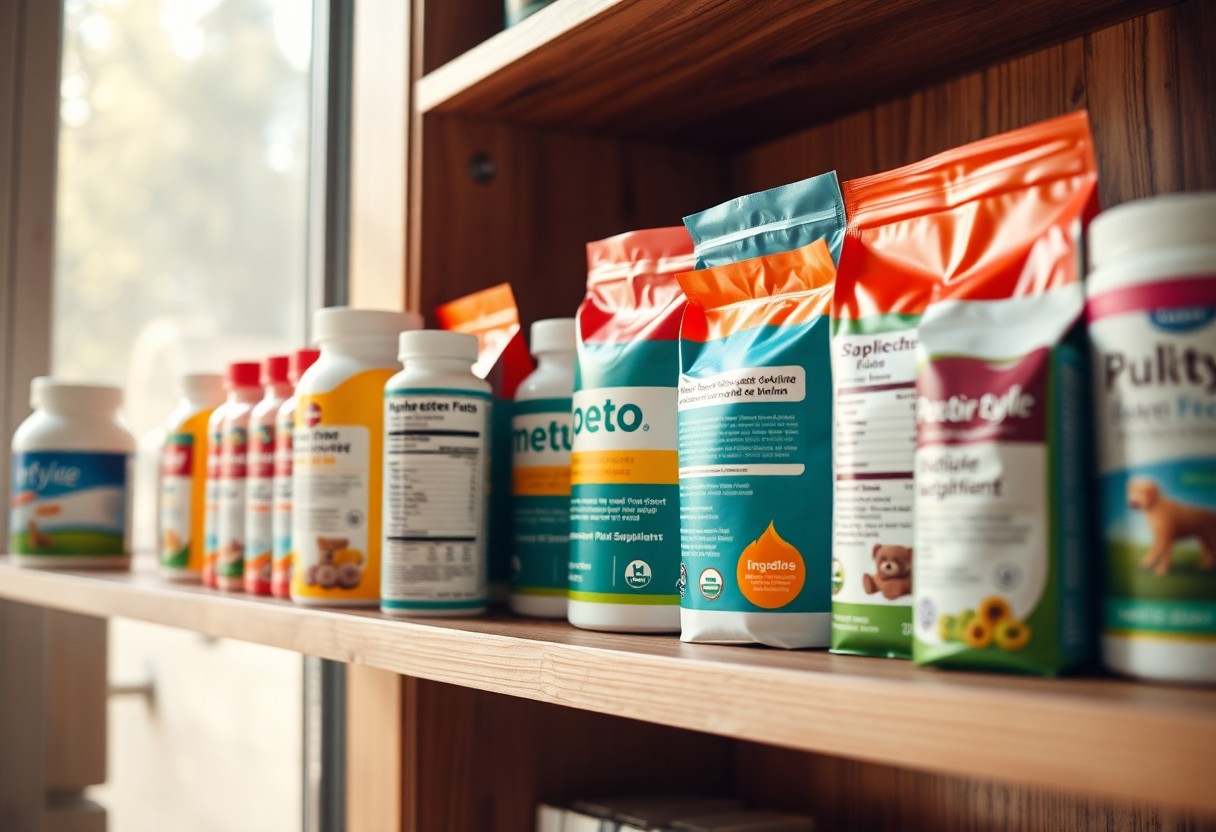Just like you, your pets can benefit from a well-rounded diet, and pet supplements play a significant role in ensuring their health and happiness. You may wonder if these products are necessary or if they can enhance your furry friend’s quality of life. In this blog post, you’ll discover the various types of supplements available, how they can support your pet’s well-being, and tips on selecting the right options for your beloved companions. Get ready to make informed choices that could lead to a healthier, more vibrant life for your pets!

Key Takeaways:
- Pet supplements can enhance the health and well-being of pets, addressing specific dietary needs and health issues.
- Regular consultation with a veterinarian is crucial to determine the right supplements for your pet’s individual requirements.
- Quality matters: Choose reputable brands that use high-quality ingredients and provide transparent information on their products.
- Observe your pet for any changes in behavior or health after starting supplements to ensure they are beneficial.
- Supplements are most effective when combined with a balanced diet and proper exercise routine for overall pet wellness.
The Science Behind Nutritional Needs
Understanding the nutritional needs of your pet requires recognizing the complex interplay between their unique biology and dietary requirements. Pets, like humans, need a balanced diet filled with the right proportions of macronutrients and micronutrients, tailored to their life stages, health conditions, and activity levels. The foundations of their nutritional needs are scientifically established through veterinary research which highlights how specific nutrients contribute to overall well-being and longevity.
Essential Nutrients for Pets: What They Really Need
Your pet requires a balanced combination of proteins, fats, carbohydrates, vitamins, and minerals for optimal health. Protein supports muscle development and immune function, while fats are vital for energy and healthy skin. Carbohydrates provide fuel for active lifestyles, and vitamins and minerals play vital roles in bodily processes, from bone development to metabolic functions.
Common Shortfalls in Pet Diets and the Role of Supplements
Despite your best efforts, many commercial pet foods fall short in meeting all of your pet’s nutritional requirements. Deficiencies in omega-3 fatty acids, certain vitamins, and minerals are frequently observed, depending on the quality of the diet and ingredient sourcing. This is where supplements can bridge the gap, ensuring that your furry friend receives the vital nutrients they might be missing from their daily meals.
For instance, many pets may not get adequate omega-3 fatty acids if they primarily consume grain-based diets. Omega-3s are vital for maintaining healthy skin and coat, as well as supporting cognitive function. Similarly, a lack of antioxidants such as vitamins C and E can lead to a weakened immune system over time. By integrating the right supplements, you can compensate for these deficiencies and enhance your pet’s health, vitality, and overall quality of life. Consulting with a veterinarian about your pet’s specific needs can help you choose appropriate supplements for their diet.
Navigating the Supplement Market
Navigating the pet supplement market can feel overwhelming due to the sheer number of options available. From joint health to digestive support, the claims can range from scientifically backed to downright dubious. A clear strategy is necessary for ensuring your furry friend receives the right support. Researching specific ingredients and consulting with your veterinarian can help you sift through the noise and make informed choices that benefit your pet’s health.
Ingredient Quality: How to Read Labels Like a Pro
Label reading doesn’t have to be a foreign language. Focus on ingredients listed in descending order of quantity, ensuring that high-quality nutrients are at the top. Look for whole-food sources, and keep an eye out for fillers or artificial additives. Understanding terms like “bioavailability” can also guide you towards supplements that deliver nutrients effectively to your pet’s body.
Recognizing Fad Supplements vs. Evidence-Based Options
The pet supplement arena is rife with trends that can mislead pet owners. Fad supplements may promise quick fixes but often lack scientific support. Established options, like glucosamine for joint health, have decades of research to back their claims. By distinguishing between fleeting trends and genuinely beneficial products, you can make choices that truly enhance your pet’s well-being.
Fad supplements capitalize on marketing buzz rather than substantive research. Examples include products claiming to detoxify pets or enhance coat shine, with little scientific backing. Evidence-based supplements, on the other hand, are often formed from rigorous studies and real-world applications. For instance, omega-3 fatty acids are well-researched for their anti-inflammatory properties and benefits for skin and coat health. Before introducing any new supplement, seek out peer-reviewed studies or consult with a veterinary professional to ensure the product you choose is rooted in biology, not just marketing hype.
Tailoring Supplements to Individual Needs
Understanding that every pet is a unique individual allows you to tailor supplements to your furry companion’s specific needs. Factors such as age, breed, activity level, and any existing health conditions all contribute to the ideal supplement regimen. By providing personalized supplementation, you can enhance your pet’s overall health and well-being while addressing any particular challenges they may face.
Age and Breed Considerations: How Requirements Vary
Different ages and breeds have varying nutritional requirements, impacting the type and dosage of supplements necessary for optimal health. For instance, puppies require different vitamins and minerals than elderly dogs, and breeds known for hip dysplasia may benefit from targeted joint support supplements tailored to their genetic predispositions. Your pet’s age and breed serve as a foundation for making informed supplement choices.
Health Conditions: Targeting Supplements for Specific Issues
Your pet may be facing specific health challenges that necessitate targeted supplementation. Whether it’s joint stiffness in older dogs, skin issues in certain breeds, or digestive problems that require extra support, supplements can play a vital role in managing these conditions. Tailoring your approach ensures that your pet receives the specific benefits they need, enhancing their quality of life.
For example, if your dog suffers from arthritis, incorporating glucosamine and chondroitin into their daily regimen can improve joint health and mobility. Similarly, probiotics can aid pets with digestive disorders by promoting gut health. It’s imperative to consult with your veterinarian to identify these health issues and to select supplements that are formulated to address them effectively, ensuring you’re not only providing good intentions but also substantial health benefits for your pet.

Safety and Regulations in Pet Supplements
Understanding the safety and regulations surrounding pet supplements ensures you make informed choices for your furry friend. The supplement industry, unlike pharmaceuticals, lacks stringent regulations, leading to variations in product quality. This calls for vigilance on your part to only choose reputable brands that adhere to safety standards and demonstrate transparency in their ingredient sourcing and manufacturing processes.
Understanding Safety Standards and Regulatory Oversight
Familiarizing yourself with safety standards can navigate the often murky waters of the pet supplement market. The Association of American Feed Control Officials (AAFCO) plays a significant role by providing guidelines for labeling and nutritional adequacy, but enforcement tends to vary. Products may escape stringent scrutiny, making it imperative for you to evaluate labels thoroughly and seek third-party testing when possible.
The Role of Veterinarians in Supplement Recommendations
Your veterinarian is an invaluable resource when considering supplements for your pet. With their medical expertise and understanding of your pet’s unique health needs, they can offer tailored advice on the best options available. Rather than self-prescribing, consult your vet, who can recommend specific supplements supported by clinical research and personal experience with your pet’s health conditions.
For example, if your dog is diagnosed with joint issues, your veterinarian may suggest glucosamine or omega-3 fatty acids based on their familiarity with research and approved products. They can also help assess potential interactions with medications or dietary restrictions, ensuring that the chosen supplements align with your pet’s overall health plan. This collaborative approach fosters trust and ensures that your pet receives the safest and most effective supplements available.
Best Practices for Introducing Supplements
Integrating supplements into your pet’s diet should be a gradual and thoughtful process. Start by consulting with your veterinarian to determine the appropriate type and dosage specific to your pet’s individual needs. Once you have a plan in place, introduce the supplement slowly while closely observing your pet’s reactions. These practices help ensure a smooth transition with minimal disruption to their daily routine.
Gradual Integration: How to Add Supplements to Your Pet’s Diet
Begin with a small dose of the supplement, mixing it into your pet’s regular food. Gradually increase the amount over a week or so, allowing your pet’s digestive system to adjust. This step minimizes the risk of gastrointestinal upset and helps your pet become accustomed to the new flavor and texture. Pay attention to their overall behavior and appetite during this transitional phase.
Monitoring Effects: Key Signs That Supplements Are Working
Monitoring your pet’s response to supplements can be as simple as noting changes in their behavior, energy level, and coat condition. Look for signs like increased activity, improved digestion, or healthier fur. Weight fluctuations, skin issues, or mood changes can signal whether the supplement is beneficial or if adjustments are necessary.
Observing your pet’s behavior can provide valuable insights into the effectiveness of supplements. For instance, if your dog becomes more playful or your cat shows increased agility, these may be positive indicators that the supplements are having a beneficial effect. Additionally, check for subtler signs, such as improved coat shine or reduced shedding, which often suggests enhanced overall health. If any adverse reactions occur, such as vomiting or lethargy, it’s wise to re-evaluate the supplement with your vet to ensure its suitability.
Summing up
With these considerations in mind, you can make informed decisions about pet supplements that best support your furry friend’s health and well-being. It’s vital to evaluate the specific needs of your pet and consult with a veterinarian to ensure you’re providing the right supplements. By doing so, you empower yourself to enhance your pet’s quality of life and contribute to their overall happiness. Let them have it—the benefits of proper supplementation could be remarkable for your beloved companion.
FAQ
Q: What are pet supplements and why are they important?
A: Pet supplements are dietary products designed to enhance the health and well-being of pets. They can include vitamins, minerals, amino acids, probiotics, and other nutrients that may not be adequately provided in a standard pet diet. These supplements can support various health aspects, such as joint health, skin and coat condition, digestive health, and overall vitality.
Q: How do I determine if my pet needs supplements?
A: To determine if your pet needs supplements, consider factors like their age, breed, health conditions, and dietary restrictions. Consulting with your veterinarian is the best approach, as they can provide tailored advice based on your pet’s specific needs, lifestyle, and any underlying health issues. Observing changes in energy levels, coat quality, or digestive health can also indicate the need for supplementation.
Q: Are all pet supplements the same, and how do I choose the right one?
A: Not all pet supplements are created equal, as they vary in quality, formulation, and purpose. When choosing a supplement, look for products that are made by reputable manufacturers, backed by scientific research, and recommended by veterinarians. Consider your pet’s specific health needs and read labels carefully to ensure the ingredients meet their dietary requirements. Always prioritize those that have undergone third-party testing for safety and efficacy.
Q: How should I administer supplements to my pet?
A: Administering supplements to your pet can be done in various ways, depending on the type of supplement. Chewable tablets, powders mixed with food, and liquid drops are common forms. Make it a positive experience by hiding supplements in treats or food if your pet is reluctant to take them. Establishing a routine can also help ensure they receive their supplements regularly. If you’re unsure about the best method for your specific product, consult your veterinarian for guidance.
Q: Can I give human supplements to my pet?
A: It is generally not advisable to give human supplements to pets, as their nutritional needs are different and some human supplements can be harmful to animals. Ingredients that are safe for humans may not be safe for pets, and the dosages may vary significantly. Always use products specifically formulated for pets, and consult your veterinarian before introducing any new supplements into your pet’s diet. This ensures their safety and well-being while addressing their nutritional needs effectively.

